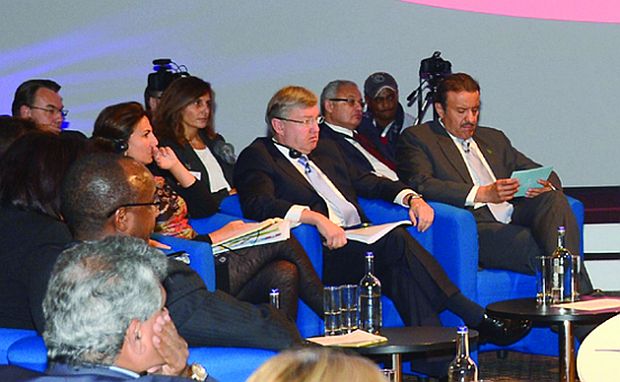
File photo of Prince Sultan Bin Salman (far right) attending the UNWTO and WTM Ministers Summit in London. (Asharq Al-Awsat)
London, Asharq Al-Awsat—London’s World Travel Market (WTM) exhibition marked another historic year for travel and tourism this week, and was attended by industry giants and international leaders, including President of the Saudi Commission for Tourism and Antiquities (SCTA), Prince Sultan Bin Salman Bin Abdulaziz.
Among the events was the UN’s World Tourism Organization (UNWTO) and WTM Ministers’ Summit, held at ExCeL London on Tuesday. The summit was attended by tourism ministers representing the attending states, as well as a number of important international organizations, including UNWTO.
SCTA President Prince Sultan Bin Salman led the Kingdom’s delegation to the 5th session of the Ministers of Tourism of Group of Twenty, known as the T20.
“We are pleased to join in discussions on the global efforts of the T20 in developing visa processes, considering that Saudi Arabians, among the group, travel abroad most frequently relative to the total population,” said Prince Sultan.
The Prince also discussed his plans to boost domestic tourism, both to the holy sites and other historical sites distinguished by UNESCO. He affirmed that Saudi Arabia’s tourist sector continues to witness growth and development under the auspices of Custodian of the Two Holy Mosques, King Abdullah Bin Abdulaziz.
“Our country enjoys the benefits of resources, which are being used in its development and in the service of its citizens,” said Prince Sultan.
He confirmed that tourism is a major contributor to Saudi Arabia’s economy, adding that it has been classified as an essential services sector in the global economy.
“Saudi Arabia, where the Two Holy Mosques are located, is a major travel destination for Arabs and Muslims around the world,” Prince Sultan said.
Travel and tourism in Saudi Arabia has witnessed promising growth over the last few years. Saudi Arabia annually hosts more than 10 million pilgrims for Hajj and Umra. The total number of Hajj pilgrims rose by 6 percent in 2012, while infrastructure projects, such as the Mecca Metro, will ensure that this continues to grow.
The UNWTO and WTM Ministers’ Summit addressed a number of issues, but predominately focused on the economic effects of developing global tourism and the role of tourism in creating employment. Participants included Dr Taleb Rifai, UNWTO Secretary-General, and David Scowsill, President and Chief Executive Officer of the World Travel & Tourism Council.
In a special seminar regarding the concerns of global tourism, Taleb Rifai highlighted “the importance of simplifying travel procedures and entry visas in order to develop the economy in our countries and create employment opportunities for the unemployed.”
Rifai focused on enhancing the issuance of tourist visas and the effects on increasing visa demands, boosting employment and the relevant and important politics and procedures for promoting global movement. The aim is create a greater interconnected world, he said.
“Although we took important steps in the last few years to encourage the movement of travelers between states, millions of people still face unnecessary restrictions and barriers, such as complex and expensive visa applications, to a high extent. These complexities do not just hinder tourism and travel, but also the economic sector, especially at a time when a lot of efforts are needed to boost the sector,” added Rifai.
